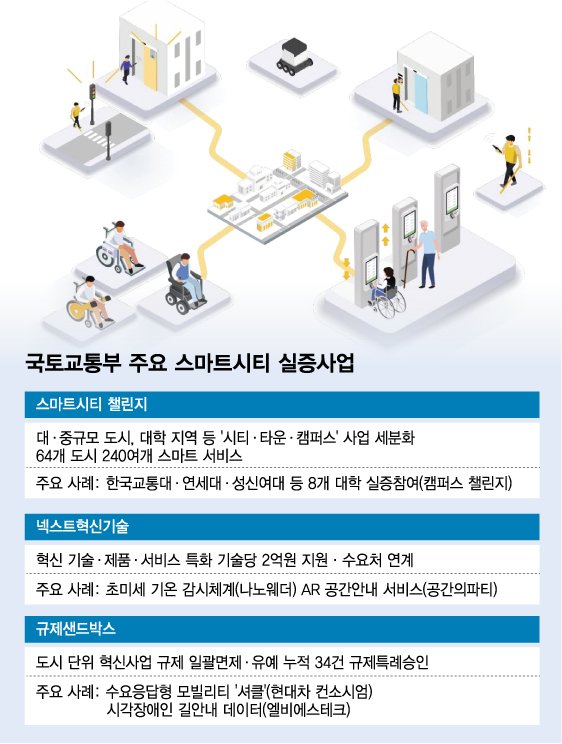[Four years of smart city, so different] ② Smarter smart city, role as a stepping stone for innovative companies to grow

#When you shine it with a smartphone camera, a virtual arrow pointing in the direction you want to go appears on the screen. It is a next-generation navigation service that works even inside large buildings. The limitations of GPS, which do not work indoors, have been overcome with 'Lidar' and 'Augmented Reality (AR)' technologies. The 'intelligent village taxi', which automatically optimizes the driving route in real time, allows users to call it on their mobile phone and get on and off the bus at any time.
Innovative technologies of ventures and startups that were almost buried because they could not find a suitable source of demand are blooming in smart cities. The Ministry of Land, Infrastructure, and Transport started in 2020 (the main project), laying the foundation for commercialization that will be properly used as a stepping stone for demonstration projects such as the Smart City Challenge, the regulatory sandbox, and the Next Innovation Technology. Thanks to these ventures and startups, they are creating a variety of opportunities, from business connection and expansion to investment attraction and overseas expansion.
The AR business card solution startup 'Party in Space' has expanded its business to include an indoor AR navigation service. While participating in the Next Innovation Technology project last November, we developed an AR technology-based indoor navigation web system, and are currently conducting a demonstration project with the Nowon Youth Future Career Center in Seoul. After the demonstration, the company plans to commercialize the indoor AR space solution service to large complex malls and logistics warehouses. Nanoweather, which developed an ultra-precise temperature information service, is also about to expand its business in earnest. Oh Jae-ho, CEO of Nanoweather, said, "We plan to expand nationwide service starting with the current demonstration project with Yeongcheon City. We are also reviewing temperature information notification service for the elderly."
Self-driving robot collaboration expands with navigation technology for the disabled
Cutting-edge technology, which had been neglected due to lack of marketability, had an 'opportunity to revive' in the smart city regulatory sandbox. 'LBS Tech', which develops a navigation platform for the visually impaired, is conducting a demonstration project not only in Sejong City but also in Ho Chi Minh City, Vietnam. As empirical data on directions has been accumulating, the possibility of an unexpected jackpot has arisen. Self-driving robot companies that need big data for city guidance are sending 'love calls'. Siwan Lee, CEO of LBS Tech, said, “We are planning to participate in the robot walkway development project this year by receiving requests from three or four domestic robot companies.”
By the beginning of this year, in the regulatory sandbox, 34 cases of demonstration projects for special regulations were promoted, and ventures and startups were given business opportunities. Participating companies also increased their employment after attracting investment. Promising companies such as the Hyundai Motor Consortium and The GL attracted a cumulative investment of 141 billion won. 19 companies, including LBS Tech and Mass Asia, netted 208 jobs. Sales such as service fees and prototype sales also generated 63 billion won.
A consortium of Hyundai Motor Company and KST Mobility, the operator of 'Macaron Taxi', introduced 'Shucle', a next-generation, demand-responsive transportation method used by 17 people. The shuttle is a kind of customized village taxi. It optimizes the driving route in real time through artificial intelligence (AI) analysis according to user calls. An official from the Shackle Consortium said, "After verifying the effectiveness of the Shackle, we plan to expand it into a new public transportation model in new towns and areas with inconvenient traffic."
The smart city is positioned as an open innovation space with open innovation business opportunities. 685 companies, universities, local governments, research institutes and academic societies are participating in the 'Smart City Convergence Alliance', a private organization. In-sang Yoo, chairman of the Smart City Convergence Alliance, predicted that “as the demand for smart cities grows, the number of successful cases in which innovative technology companies gain a foothold for commercialization and universities and local governments gain opportunities for sustainable development will increase in the future.”
[Joint Planning: Ministry of Land, Infrastructure, and Transport Money Today]



